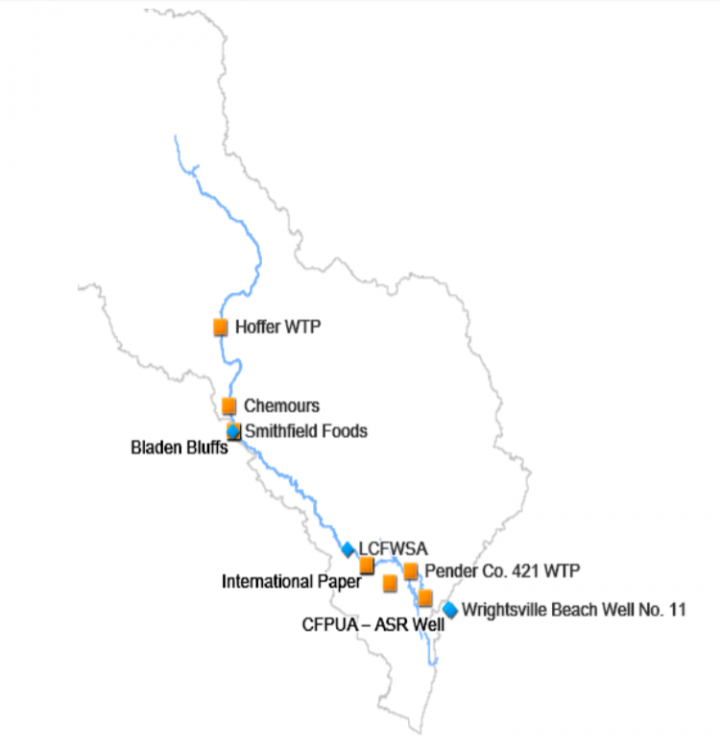
Conservation groups and state environmental regulators announced Thursday further steps Chemours’ Fayetteville Works facility must take to reduce by at least 99% GenX and other polyfluoroalkyl substances from reaching the Cape Fear River and downstream drinking water supplies.
The North Carolina Department of Environmental Quality and Southern Environmental Law Center, on behalf of Cape Fear River Watch, announced the additional actions presented in an addendum to the consent order finalized February 2019.
Supporter Spotlight
Combined with the 2019 consent order’s requirement that Chemours reduce its pollution from air emissions by 99.99% and from a large on-site stream by at least 99%, Thursday’s agreement ensures that pollution from every other significant pathway of PFAS contamination from the Chemours’ Fayetteville Works Facility to the Cape Fear River is reduced by at least 99%, according to the Southern Environmental Law Center.
“This agreement is an important investment in the future of the Cape Fear River,” Geoff Gisler, senior attorney at the Southern Environmental Law Center, said in a statement. “The commitments required of the company will result in significant reductions in PFAS levels in the river quickly and ensure that communities downstream are protected over the long-term.”
NCDEQ actions and the consent order have stopped the process wastewater discharge since 2017 from the facility and drastically reduced air emissions of PFAS by 99.9%, according to NCDEQ. The additional actions presented Thursday will further reduce the PFAS contamination to the Cape Fear River and improve water quality for downstream communities, officials said.
“We have already issued significant penalties and ordered Chemours to stop actively polluting. Today’s actions lay out exactly how Chemours will clean up the residual contamination they’ve caused that continues to impact communities along the Cape Fear River,” said DEQ Secretary Michael S. Regan in a statement. “This level of action is unprecedented and continues to build a foundation for the Attorney General’s broader investigation of PFAS in North Carolina. As a state, we will not wait for action from the federal government to provide relief for our communities and protect our natural resources.”
Attorney General Josh Stein announced Monday a formal investigation into manufacturers and other parties responsible for PFAS contamination in North Carolina. Stein will expand his investigation into PFAS contamination to understand the extent of the damages to North Carolina’s natural resources caused by contamination from GenX and other PFAS chemicals and to further evaluate contamination elsewhere in the surface waters, soils, and groundwater of North Carolina.
Supporter Spotlight
“North Carolinians expect and deserve clean water to drink,” said Stein. “The emergence of forever chemicals like PFAS has led to significant and dangerous pollution – and we must hold those responsible accountable. This investigation is about protecting people from current and future PFAS contamination and restoring North Carolina’s damaged natural resources. My office will not hesitate to bring legal action against any polluters if that’s what it takes to keep the people of North Carolina safe.”
A 30-day public comment period will be held on the agreement announced Thursday before it is submitted to the Bladen County Superior Court for approval. If approved by the court, the agreement will be enforceable and amend the consent order the parties finalized in February 2019.
“This is a huge win for the Cape Fear River and the people who depend on it. This plan will ensure that contaminated groundwater, streams, and runoff no longer pollute the river and don’t reach communities downstream,” said Kemp Burdette, Cape Fear Riverkeeper. “Along with a reduction of PFAS in air emissions from the facility and a complete elimination of process water discharges into the river that were part of the earlier consent order, these commitments get us closer to a goal of a clean Cape Fear.”
Chemours is required to treat four identified “seeps,” which account for more than half of the contaminated groundwater reaching the river in two phases, according to the state.
“The interim measures to filter PFAS at an efficiency of at least 80% from the first of the four seeps will go into effect starting by Mid-November – with all four completed by April 2021. The permanent measure is the construction of a subsurface barrier wall approximately 1.5 miles long and groundwater extraction system that will remove at least 99% of PFAS to be completed by March 2023,” according to the state.
Chemours is also required to treat on-site stormwater that is adding residual pollution to the river with a capture and treatment system that must remove at least 99% of PFAS. Failure to meet the schedules or achieve the removal goals will result in financial penalties, including the following:
- Failure to meet the construction schedule for the interim measures will result in fines of $5,000 per day for the first 14 days and $10,000/day until construction is complete.
- Failure to meet the barrier wall installation schedule results in a $150,000 fine followed by $20,000 per week until installation is complete.
- Failure to meet the barrier wall’s 95% mass loading goal in the initial demonstration results in a $500,000 fine, with a $100,000 fine for failure to meet any of the four subsequent demonstrations.
The amendment to the consent order “is a critical next step for cleaning up contamination that took place over decades,” according to the release. The company will need to resubmit a corrective action plan to ensure that contaminated groundwater on- and offsite is cleaned up and communities near the facility are protected. DEQ in April rejected Chemours’ previously submitted corrective action plan.
“Chemours is pleased to have reached agreement with the North Carolina Department of Environmental Quality (NCDEQ) and Cape Fear River Watch (CFRW) on amendments to the Court Approved Consent Agreement from February 2019. Prior to this agreement, actions already taken by our company had substantially reduced levels of site-related PFAS from reaching the environment,” according to a statement from Chemours Thursday afternoon.







